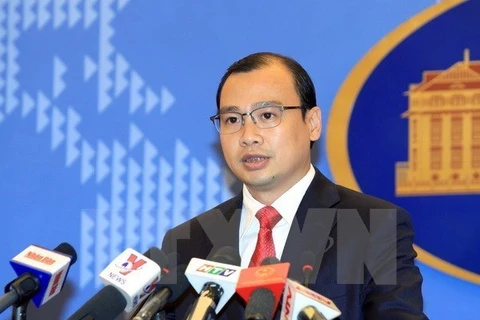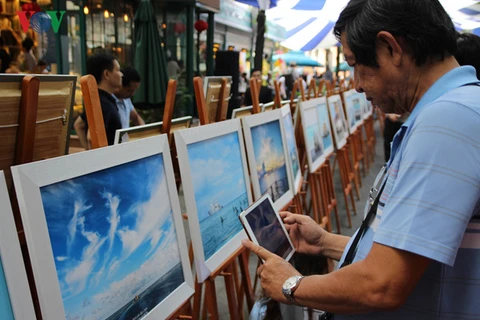Thua Thien – Hue (VNA) – Vietnamese leading researchers gathered at a workshop in the central coastal province of Thua Thien – Hue on December 13 to present old documents issued by the Europeans, which are proof of Vietnam’s sovereignty over Hoang Sa (Paracel) archipelago.
According to Dr. Tran Duc Anh Son, a well-known researcher in the field, French Navy sailor Jean Baptiste Chaigneau wrote in his memoir Le mesmoire sur la Cochinchine that Hoang Sa was an uninhabited island until Emperor Gia Long, the first King of the Nguyen Dynasty (1802-1945) declared sovereignty in 1816.
The Journal of an Embassy from the Governor-General of India to the Courts of Siam and Cochinchina by late diplomat John Crawfurd, published in 1830 in London, also includes lines saying that the emperor in 1816 took over the Paracel, which was then under no dispute over its sovereignty.
The book Die Erdkunde von Asien by Calt Ritter, published in Berlin in 1834, said the same, adding that neighbouring countries, including China, did not dispute the sovereignty declaration over Paracel by the emperor.
The Nguyen Dynasty’s Dai Nam Thuc Luc (Great South Real Record) in 1816 recorded that the emperor sent a royal marine troop to monitor and undertake measuring work on Hoang Sa. Dai Nam is the former name of Vietnam.
Son said Vietnam’s sovereignty over the archipelago has been clear since over 200 years ago.
Professor Nguyen Quang Ngoc, deputy chairman of the Vietnam Scientific History Association, said royal documents issued by the Nguyen Dynasty presented details of the work and contributions of localities, including central coastal provinces of Thua Thien – Hue, Quang Ngai and Binh Thuan, for protecting the archipelago, and these also served as evidence of Vietnam’s sovereignty.
The researchers gathered for a seminar on the issue where they pledged to research more old documents from Japan, the Republic of Korea, and China related to the archipelago in an attempt to present an accurate picture of the East Sea dispute to citizens around the world.-VNA
According to Dr. Tran Duc Anh Son, a well-known researcher in the field, French Navy sailor Jean Baptiste Chaigneau wrote in his memoir Le mesmoire sur la Cochinchine that Hoang Sa was an uninhabited island until Emperor Gia Long, the first King of the Nguyen Dynasty (1802-1945) declared sovereignty in 1816.
The Journal of an Embassy from the Governor-General of India to the Courts of Siam and Cochinchina by late diplomat John Crawfurd, published in 1830 in London, also includes lines saying that the emperor in 1816 took over the Paracel, which was then under no dispute over its sovereignty.
The book Die Erdkunde von Asien by Calt Ritter, published in Berlin in 1834, said the same, adding that neighbouring countries, including China, did not dispute the sovereignty declaration over Paracel by the emperor.
The Nguyen Dynasty’s Dai Nam Thuc Luc (Great South Real Record) in 1816 recorded that the emperor sent a royal marine troop to monitor and undertake measuring work on Hoang Sa. Dai Nam is the former name of Vietnam.
Son said Vietnam’s sovereignty over the archipelago has been clear since over 200 years ago.
Professor Nguyen Quang Ngoc, deputy chairman of the Vietnam Scientific History Association, said royal documents issued by the Nguyen Dynasty presented details of the work and contributions of localities, including central coastal provinces of Thua Thien – Hue, Quang Ngai and Binh Thuan, for protecting the archipelago, and these also served as evidence of Vietnam’s sovereignty.
The researchers gathered for a seminar on the issue where they pledged to research more old documents from Japan, the Republic of Korea, and China related to the archipelago in an attempt to present an accurate picture of the East Sea dispute to citizens around the world.-VNA
VNA























